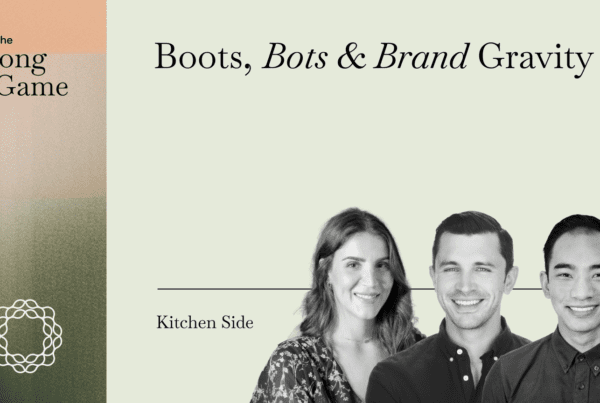
We launched The Long Game podcast in December 2020. At the time, we didn’t have a grandiose content plan or strategy, and we certainly didn’t have a huge budget.
We had good relationships with industry experts, and we wanted to maximize those.
We like to take a “learn and pivot as you go” approach with most things we do, and it’s worked out well for the podcast.
We’ve consistently ranked on many of the top b2b marketing podcasts blogs like this: 28 Marketing Podcasts That Inspire HubSpot’s Content Team, and The 21 Best Content Marketing Podcasts in 2022.
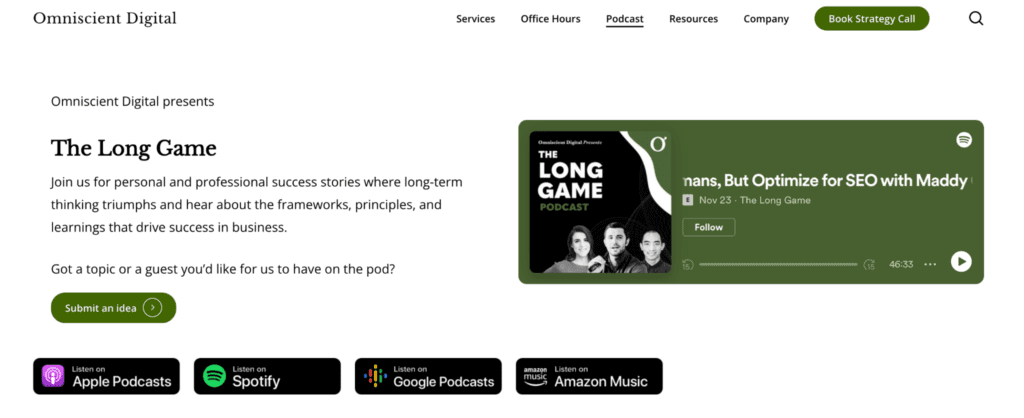
We’re now 100 episodes in, and the podcast has been a vehicle to position us as an authoritative voice in the content marketing space. It’s also been a great way to nurture relationships, even turning some guests into clients.
The advantages of hosting a podcast far outweigh the minimal investment it takes. Here are our most significant learnings.
What are the benefits of a B2B podcast?
There are many advantages to having a podcast, especially in the world of B2B marketing. But it also depends on what your goals are. If you’re looking to nurture existing relationships with your audience, then podcasting can be an effective and low-cost way to do so.
If you’re solely relying on a podcast for brand awareness or lead generation and bringing in net-new traffic, they generally don’t work that way.
In other words, you should start a podcast for more than just reach. Podcasts are much more effective at building trust and fostering relationships with those already in your universe, or Omniverse, as we call ours.
With that in mind, they can add tremendous value to your nurturing sequence, and they’re an effective ABM (account-based marketing) tactic.
Bottom line: Podcasting is a great way to get closer to your audiences, and if you’re willing to put in the time, it can be economical and practical.
Launching the Podcast
When we launched The Long Game, a content marketing podcast where we share personal and business success stories in which long-term thinking triumphs, we didn’t have any kind of content plan in place.
We just knew we wanted to talk to other marketing leaders, experts, entrepreneurs, and founders in the content marketing space.
Ultimately, it was a very self-serving goal because as we were building our content marketing agency, the podcast provided a platform to exchange ideas and have insight conversations where we’d learn a lot along the way.
We’ve picked the brains of people like Tracey Wallace, Dave Gerhardt, and Rand Fishkin, and shared quality content on startup culture, building marketing teams, how to be an effective CMO, content strategy, what thought leadership is and isn’t, and so much more.
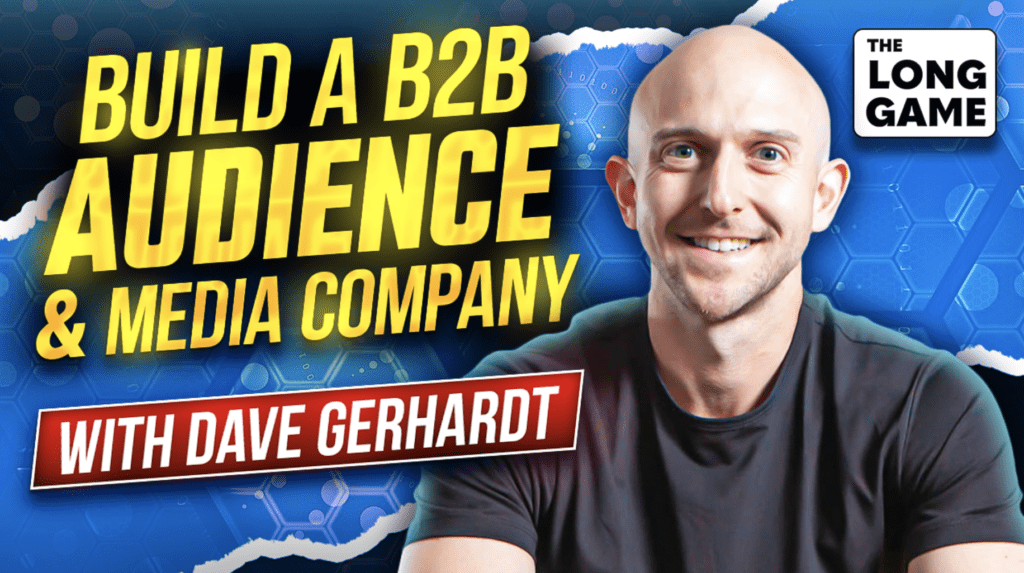
This platform has proved to be an excellent way to go deep into topics we may not have had the chance to otherwise.
The conversations average about an hour long and we publish them weekly. We also repurpose the episodes in various ways across our channels (more on that later).
Podcast Planning & Ideation
If you’ve decided to start a podcast, there are a few questions to ask yourself. Think about your target audience and use these questions as a guide:
- What is your b2b marketing strategy, and how do podcasts fit within that?
- Whom are you trying to reach?
- What is your niche?
- What topics would be of interest to your existing audience?
- Whom can you interview?
- Do you have any existing relationships with industry leaders you can interview?
- What format will your podcast take? Will it be interview-based, or will you include storytelling or other elements?
Once you have an idea of the content you want to produce, start thinking about logistics:
- How will you record and edit your episodes?
- Do you have a team that can help? Can you budget for outsourcing?
- Will you be the only host, or will you have co-hosts?
What do you need to start a podcast?
What you need to begin a podcast is minimal. Come up with a name that will atrract the right listeners. You can do research to make sure the name is not taken, but not a big deal if it is.
As you can see, there are many The Long Game podcasts, but your niche will help differentiate you from the others.

Here are the tools/platforms we use:
- Simplecast is a platform that allows you to stream directly to Apple Podcasts, Spotify, Amazon Music, Pandora, Google, and many more hosting platforms. First, you’ll need to set up your podcast accounts on each hosting platform, and then you can go back to Simplecast to complete the setup.
Simplecast also allows you to track basic analytics such as number of downloads, regions reached, highest-performing episodes, and more.
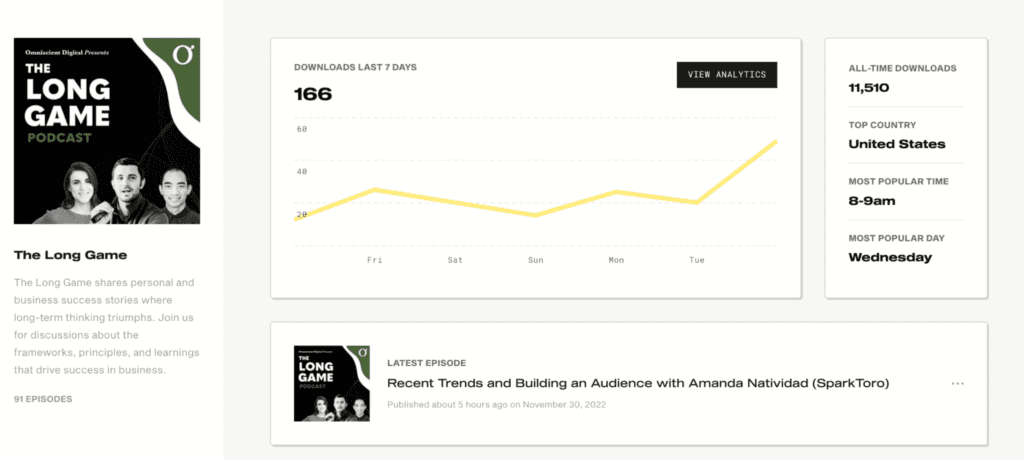
- Procket is a service that turns your episodes into ready-to-publish assets
- Fiverr is a marketplace for freelance designers. We use them to create our episode thumbnails. You can also find an artist to design your main podcast artwork too.
- You’ll need an editor. If you don’t know anyone personally, tap into your network or source one on Fiverr.
- You can use Zoom or Riverside.fm to record the episodes
- Airtable is what we use for our internal workflow database. We have a publishing calendar and board to track which episodes are in the queue, uploaded, and published.
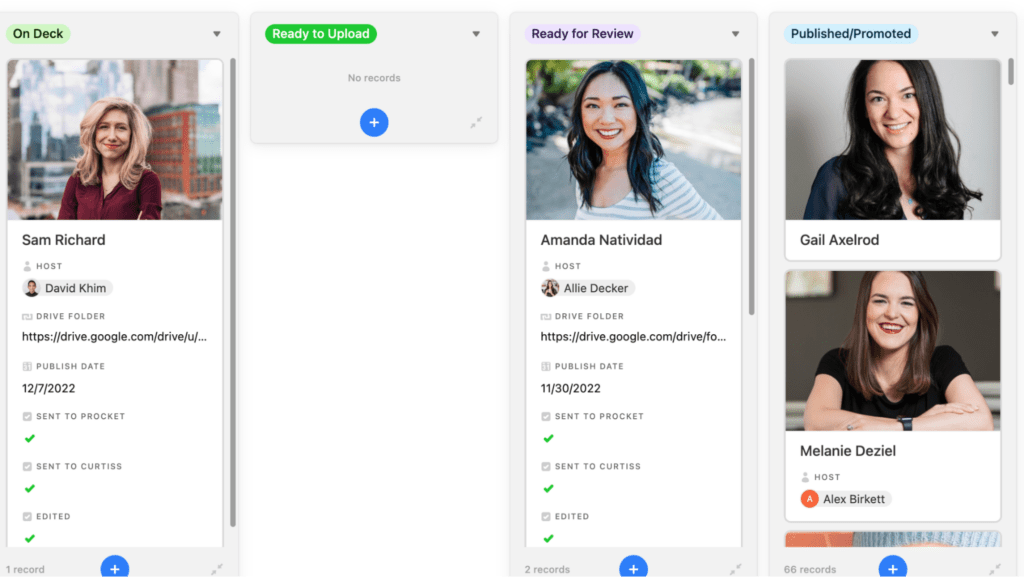
Before you can start publishing podcasts on Simplecast, you will need a few items.
1. Invest in a good mic
If you invest in nothing else, get a good mic. People will forgive bad video quality (if you’re reposting this to YouTube), but they won’t always forgive bad audio.
Here are our suggestions for high-quality podcast mics:
2. Podcast Artwork
You’ll need a good thumbnail which will stand out in the sea of podcast images. If I could go back, I’d probably choose a brighter thumbnail, but I also wanted to stay on brand (black, green, & white). I’d suggest getting an artist to design one for you.
3.Podcast Jingle
You should have an intro song so listeners can identify it with your podcast.
The format of our episodes begins with one of our hosts welcoming you to The Long Game, a brief introduction to the guest or topic, the intro song, and the episode. We close the episode with the song too.
4.Podcast Description
Prepare a brief description of your podcast, the topics you plan to cover, and, most importantly, who it’s for. A paragraph or two is sufficient.
5.Have Three Episodes in the Can
Before you can launch your podcast on Simplecast you’ll need three recorded episodes ready-to-go. That’s the minimum and it’s good to get ahead too.
If you’ve followed these steps, you’re ready to launch your podcast. Simplecast has more great blogs and checklists on this process too.
6. Podcast Host
A podcast host is like a website hosting provider but for podcasts. It’s optimized for audio files and for serving lots of requests. The host will provide the RSS feed that you submit to major listening apps like Apple Podcasts and Spotify.
Castos is a great podcast host for new and veteran podcasters. It’s a simple platform with lots of powerful tools to create, distribute, and monetize your show.
Booking Podcast Guests
Booking guests doesn’t have to entail a robust pitch strategy with fancy metrics to show. It can be as simple as sending an email to your connections, asking to have a conversation to publish to your podcast.
In the beginning, lean on your existing relationships because having that rapport makes it more likely they’ll agree to an interview.
Our co-founders book all interviews themselves. I asked them if most of the people they reach out to say “yes,” and they say 95%+ do.
I also asked how many of those people they reach out to are existing relationships vs. cold outreach:
Alex says 60% are existing relationships
David says 30% are existing relationships
Allie says 75% are existing relationships
This just goes to show you that a good chunk of those pitches are cold, which is tremendous because we certainly don’t have a million downloads or a high podcast ranking. We have 11k downloads to date and no one even asks us anyway.
A million downloads and followers are nice vanity metrics, but we’ve learned they are not required to book guests. In fact, a large number of downloads only play a big factor when you are trying to secure sponsors.
You might be surprised to find out who will agree to be interviewed. Most people are honored to, so reach for the stars (literally).
In your email to the prospective guest, include an interesting angle or story you can discuss based on their expertise. When they agree, we send them a questionnaire to help both parties prepare for the interview.
We ask for the basics, such as their name, company, and bio.
Plus the following:
- What 2-3 business-related topics are you excited to talk about?
- What are 1 or 2 non-work-related topics you’re very excited about?
- What are you currently promoting?
We find people are delighted to learn they don’t just have to talk about their line of work. We’re open to exploring other passions or topics, too, such as poker strategies, music, meditation, you name it. We want them to see the value in giving us an hour of their precious time.
Plan to record a compelling introduction to your guest immediately after recording the interview. The convo will be fresh in your mind, and you’ll have a general sense of the takeaways your listeners can expect from the episode.
Pro-tip: Don’t wait days or weeks later to record one. It’s much harder to recall details of the conversation.
Maximize What You’re Good At, Outsource The Rest
You’re great at interviewing. Fantastic.
But you can’t edit. Outsource to an editor. Actually, even if you are a decent editor, I’d suggest outsourcing it.
Doing the editing yourself takes time/energy that you could be using to interview more people or drive more business results, and that’s what will drive people to your podcast.
Think about it: a great conversation is the foundation of your podcast. Get that part right, then hand over the details to a team who can make it production-ready.
Editing
People like to digest content in a variety of ways these days. If they don’t want to listen to the podcast, they can watch a video clip on YouTube. Or maybe they prefer to scan the key takeaways.
We record our interviews on Zoom, so we have the video file too.
We send the video file to our editor and pay him a flat fee per episode. (There is no set standard in the industry. Everything is negotiable between you and the editor.)
According to our notes, he cuts together the intro, song, and episode. We take the video clip and post it to our YouTube channel. We’ve found that 20-30 minute video clips perform much better than publishing the entire hour-long episode to YouTube. Posting the full interview hurts our algorithm and lowers retention because most people don’t want to watch an hour-long podcast on video.
Repurposing
One piece of content can go a long way. Repurposing an episode is a great way to maximize your piece so it gets the most mileage.
For repurposing, we use a service called Pocket. They take each episode and do all of the copywriting for us, and deliver the following assets:
- Episode Description
- Show Topics
- Show Links
- Key Takeaways
- Blog post
- Linkedin posts
- Twitter threads
- Guest posts
- Video clips for social media
Since people want to consume content differently, you should cater to that. There are endless possibilities when it comes to repurposing your podcast content. By getting creative, you can reach new listeners and followers and keep them engaged with your show for years to come.
Promotions
If you publish an episode but don’t promote it, you’re missing out on the opportunity to keep your audience engaged with your content. Have a social media marketing plan to keep your audience in the loop when a new episode ships. The repurposed assets are a great way to enhance your podcast marketing strategy.
We focus on Linkedin, Twitter, and Slack communities to promote episodes because we know that’s where our audience lives. Having a social media marketing strategy is a great way to generate interest in our show and get people curious about the topic. The 20-30 second video clips Procket sends us makes for great social media content.
I also email the guest letting them know we have published the episode. I include links to the blog, video, and audiograms, with a tailored social post for them to post on their channels. They may not use it word-for-word, but it gives them a good starting point and encourages them to promote the episode. You want to tap into their audiences too.
Key Takeaways > Transcripts
A transcript is usually a computer-generated record of every word said transcribed into written text. This includes the uhs and ums. Although, you can easily remove those with tools like Descript.
But who wants to sit through and read every word of an hour-long podcast?
Instead, key takeaways include a summary of a given topic, a timecode, and a concise quote, making it much easier for the reader to digest the most important part.
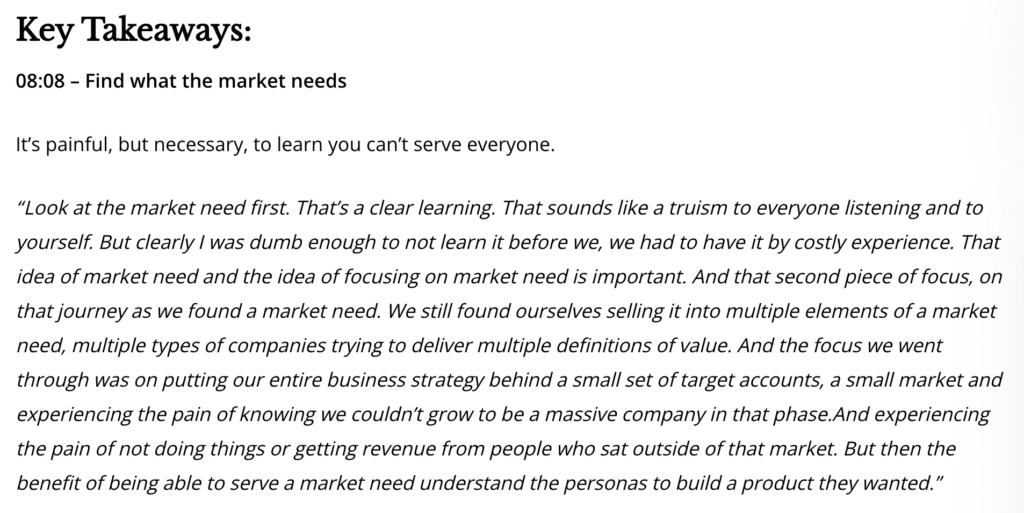
You can see another example here: Kitchen Side: How Our Thinking of Content Strategy has Evolved Over Time
Including key takeaways from our podcast interviews also helps to optimize it for SEO and drives more traffic to our content.
The Biggest Indicator of Success: Consistency
Our podcast listeners have grown steadily over the last year. I attribute that to publishing consistently. Not only are we publishing a high-volume of content, but our audience can expect a new episode each week.
Whether you decide to publish monthly or weekly, pick a day to publish your podcast and stick to it. We publish episodes every Wednesday, and we’re preparing to increase that cadence to twice a week in 2023.
This cadence also keeps us all accountable to continue the trajectory we are on. We have a heavy backlog of recorded episodes, and a process in place to track each stage of production.
Closing
Podcasting is a great way to connect with your audience and grow your brand.
It’s rewarding to hear The Long Game brought up in the b2b space at events and dinners. And we love seeing it mentioned in Twitter threads and Slack communities. That in itself has been the greatest measure of success for us.
We can continue to aim for 1,000,000 downloads someday, but we are reaping the benefits in many other ways. We’re fostering relationships and gaining incredible insight along the way, which makes it 1000% worth it.
Podcasts are not supposed to produce massive results overnight, but if you remain consistent, engage in genuine conversations, and share the value, you’ll reap the benefits. Just remember, it’s a long game.
